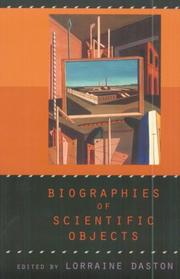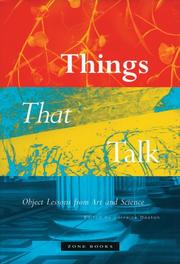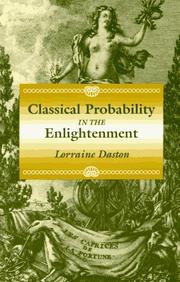| Listing 1 - 10 of 50 | << page >> |
Sort by
|

ISBN: 0226136701 0226136728 9780226136721 Year: 2000 Publisher: Chicago : University of Chicago Press,
Abstract | Keywords | Export | Availability | Bookmark
 Loading...
Loading...Choose an application
- Reference Manager
- EndNote
- RefWorks (Direct export to RefWorks)
kennisleer --- Theory of knowledge --- epistemology --- wetenschappelijk denken --- wetenschapsgeschiedenis --- Philosophy of science --- Knowledge, Theory of. --- Science --- History. --- Philosophy. --- Knowledge, Theory of --- Normal science --- Epistemology --- Philosophy --- Psychology --- History --- Épistémologie. --- Philosophie des sciences --- Sciences --- Histoire

ISBN: 9781890951443 1890951439 1890951447 Year: 2004 Publisher: New York : Zone Books,
Abstract | Keywords | Export | Availability | Bookmark
 Loading...
Loading...Choose an application
- Reference Manager
- EndNote
- RefWorks (Direct export to RefWorks)
Imagine a world without things. There would be nothing to describe, explain, remark on, interpret, or complain about. Without things, we would, in short, stop speaking ; we would become as mute as objects are alleged to be. In nine original essays, internationally renowned historians of art and of science seek to understand how objects become charged with significance without losing their gritty materiality. Things That Talk aims to escape the opposition between positivist facts and cultural readings that bifurcates the current historiography of both art and science. Confronting this impasse from an interdisciplinary perspective, each author singles out one object for close attention : a Bosch drawing, the freestanding column, a Prussian island, soap bubbles, early photographs, glass flowers, Rorschach blots, newspaper clippings, paintings by Jackson Pollock. Each object is revealed to be a node around which meanings accrete thickly. But not just any meanings: what these things are made of and how they are made shape what they can mean. Neither the pure texts of semiotics nor the brute objects of positivism, these things are saturated with cultural significance. Things become talkative when they fuse matter and meaning; they lapse into speechlessness when their matter and meanings no longer mesh.
Art and science. --- Semiotics and art. --- Object (Aesthetics) --- Object (Philosophy) --- 7.01 --- 7.03 --- Pollock Jackson --- Grosz George --- collage --- montage --- krantenknipsels --- rorschachtest --- Rorschach Hermann --- plantkunde --- botanica --- fotografie --- zeepbellen --- Pfaueninsel --- eilanden --- zuilen --- architectuur --- Bosch Hieronymus --- designtheorie --- productdesign --- perceptie --- waarneming --- kunsttheorie --- kunst en wtenschap --- kunst --- Philosophy --- Aesthetic object --- Aesthetics --- Art and semiotics --- Art --- Science and art --- Science --- Art et sciences --- Sémiotique et art --- Objet (Esthétique) --- Objet (Philosophie) --- Object (Aesthetics). --- Sémiotique et art --- Objet (Esthétique) --- Art and science --- Semiotics and art --- Semiotics --- Object (Philosophy). --- Sémiotique --- Objet --- Analyse de l'art --- Culture
Book
ISBN: 9780262537339 0262537338 9780262353809 0262353806 Year: 2019 Publisher: Cambridge, Massachusetts : MIT Press,
Abstract | Keywords | Export | Availability | Bookmark
 Loading...
Loading...Choose an application
- Reference Manager
- EndNote
- RefWorks (Direct export to RefWorks)
A pithy work of philosophical anthropology that explores why humans find moral orders in natural orders. Why have human beings, in many different cultures and epochs, looked to nature as a source of norms for human behavior? From ancient India and ancient Greece, medieval France and Enlightenment America, up to the latest controversies over gay marriage and cloning, natural orders have been enlisted to illustrate and buttress moral orders. Revolutionaries and reactionaries alike have appealed to nature to shore up their causes. No amount of philosophical argument or political critique deters the persistent and pervasive temptation to conflate the is of natural orders with the ought of moral orders. In this short, pithy work of philosophical anthropology, Lorraine Daston asks why we continually seek moral orders in natural orders, despite so much good counsel to the contrary. She outlines three specific forms of natural order in the Western philosophical tradition-specific natures, local natures, and universal natural laws-and describes how each of these three natural orders has been used to define and oppose a distinctive form of the unnatural. She argues that each of these forms of the unnatural triggers equally distinctive emotions: horror, terror, and wonder. Daston proposes that human reason practiced in human bodies should command the attention of philosophers, who have traditionally yearned for a transcendent reason, valid for all species, all epochs, even all planets.
08.36 philosophical anthropology, philosophy of psychology. --- Ethics. --- Natur. --- Philosophical anthropology. --- Philosophy of nature. --- Philosophical anthropology --- Philosophy of nature --- Ethics --- cultuurfilosofie --- 130.2 --- ethiek --- antropologie --- natuur --- filosofie --- Deontology --- Ethics, Primitive --- Ethology --- Moral philosophy --- Morality --- Morals --- Philosophy, Moral --- Science, Moral --- Philosophy --- Values --- Nature --- Nature, Philosophy of --- Natural theology --- Anthropology, Philosophical --- Man (Philosophy) --- Civilization --- Life --- Ontology --- Humanism --- Persons --- Philosophy of mind

ISBN: 0691084971 069100644X Year: 1988 Publisher: Princeton (N.J.): Princeton university press
Abstract | Keywords | Export | Availability | Bookmark
 Loading...
Loading...Choose an application
- Reference Manager
- EndNote
- RefWorks (Direct export to RefWorks)
Probabilities --- Science --- Probability --- Statistical inference --- Combinations --- Mathematics --- Chance --- Least squares --- Mathematical statistics --- Risk --- History --- History of philosophy --- anno 1700-1799
Book
ISBN: 9780226432366 9780226432229 022643236X 9780226432533 022643253X 022643222X Year: 2017 Publisher: Chicago London
Abstract | Keywords | Export | Availability | Bookmark
 Loading...
Loading...Choose an application
- Reference Manager
- EndNote
- RefWorks (Direct export to RefWorks)
Archives bring to mind rooms filled with old papers and dusty artifacts. But for scientists, the detritus of the past can be a treasure trove of material vital to present and future research: fossils collected by geologists; data banks assembled by geneticists; case histories published in medical journals; weather diaries and data silos trawled by climate scientists; libraries visited by historians. These are the vital collections, assembled and maintained over millennia, which define the sciences of the archives. With 'Science in the Archives', Lorraine Daston offers the first study of the important role that these archives play in the natural and human sciences. Ranging across disciplines and centuries, contributors cover episodes in the history of astronomy, geology, genetics, philology, climatology, medicine, and more - as well as fundamental practices such as collecting, retrieval, and data mining. Chapters cover topics ranging from doxology in Greco-Roman antiquity to NSA surveillance techniques of the twenty-first century. Thoroughly exploring the practices, politics, economics, and potential of the sciences of the archives, this volume reveals the essential historical dimension of the sciences, while also adding a much-needed long term perspective to contemporary debates over the uses of Big Data in science.
Scientific archives --- Science --- Archives --- History --- Scientific archives. --- History. --- Big Data. --- collections. --- data retrieval. --- databases. --- libraries. --- scientific archives.
Book
ISBN: 9780691156989 9780691239187 0691156980 0691239185 0691254087 Year: 2022 Publisher: Princeton: Oxford: Princeton University Press,
Abstract | Keywords | Export | Availability | Bookmark
 Loading...
Loading...Choose an application
- Reference Manager
- EndNote
- RefWorks (Direct export to RefWorks)
A panoramic history of rules in the Western worldRules order almost every aspect of our lives. They set our work hours, dictate how we drive and set the table, tell us whether to offer an extended hand or cheek in greeting, and organize the rites of life, from birth through death. We may chafe under the rules we have, and yearn for ones we don't, yet no culture could do without them. In Rules, historian Lorraine Daston traces their development in the Western tradition and shows how rules have evolved from ancient to modern times. Drawing on a rich trove of examples, including legal treatises, cookbooks, military manuals, traffic regulations, and game handbooks, Daston demonstrates that while the content of rules is dazzlingly diverse, the forms that they take are surprisingly few and long-lived.Daston uncovers three enduring kinds of rules: the algorithms that calculate and measure, the laws that govern, and the models that teach. She vividly illustrates how rules can change-how supple rules stiffen, or vice versa, and how once bothersome regulations become everyday norms. Rules have been devised for almost every imaginable activity and range from meticulous regulations to the laws of nature. Daston probes beneath this variety to investigate when rules work and when they don't, and why some philosophical problems about rules are as ancient as philosophy itself while others are as modern as calculating machines.Rules offers a wide-angle view on the history of the constraints that guide us-whether we know it or not.
Authority. --- Order (Philosophy) --- Algorithms. --- Law. --- Natural law. --- Order (Philosophy). --- General ethics --- World history --- Authority --- Algorithms --- Law --- Natural law --- Computer algorithms. --- Ethics. --- Actin. --- Algorithm. --- Analogy. --- Aphorism. --- Augustine of Hippo. --- Biotope. --- Braid. --- Brain. --- Brightness. --- Calculation. --- Casuistry. --- Cataclysm (Dragonlance). --- Catechism. --- Chapter 33 (G.I. Bill of Rights). --- Charles Babbage. --- Codification (law). --- Computer program. --- Consonant. --- Culprit. --- Cydnidae. --- Cytoplasmic incompatibility. --- Depiction. --- Designer. --- Dictionary. --- Discretion. --- Drosophila. --- Early Modern literature. --- Electricity. --- Electronics. --- Epithelium. --- Fertilisation. --- Fishing. --- Francis Bacon. --- Gamma ray. --- Genre. --- Good and evil. --- Gottfried Wilhelm Leibniz. --- Government debt. --- Gut flora. --- Hannah Glasse. --- Herder. --- His Family. --- Horntail. --- Household. --- Human intelligence (intelligence gathering). --- Human intelligence. --- Imitation. --- Indication (medicine). --- Insect. --- John Herschel. --- Kinase. --- Lactobacillus. --- Lipid. --- Lookup table. --- Mathematician. --- Mathematics. --- Measurement. --- Metabolism. --- Metabolite. --- Metaphysics. --- Microbiota. --- Microorganism. --- Miguel de Cervantes. --- Monochord. --- Nationalism. --- Natural philosophy. --- Obedience (human behavior). --- Organism. --- Parallel Lives. --- Parchment. --- Pathogen. --- Philosophy. --- Phonetics. --- Polykleitos. --- Precept. --- Prerogative. --- Public utility. --- Publishing. --- Reason. --- Result. --- Rule of Saint Benedict. --- Sect. --- Shavian alphabet. --- Shawl. --- Simon Stevin. --- Spelling rule. --- State of nature. --- Statute. --- Straightedge. --- Subtitle (captioning). --- Subtraction. --- Supplication. --- The Nautical Almanac. --- The Opposite Direction. --- Titer. --- Treatise. --- Tropical rainforest. --- Usage. --- Warfare.
Book
Year: 2001 Publisher: München : Carl Friedrich von Siemens Stiftung,
Abstract | Keywords | Export | Availability | Bookmark
 Loading...
Loading...Choose an application
- Reference Manager
- EndNote
- RefWorks (Direct export to RefWorks)
Histoire des sciences --- Sciences --- Philosophie --- Histoire
Book
Year: 2001 Publisher: München Carl Friedrich von Siemens Stiftung
Abstract | Keywords | Export | Availability | Bookmark
 Loading...
Loading...Choose an application
- Reference Manager
- EndNote
- RefWorks (Direct export to RefWorks)
Book
Year: 2000 Publisher: München Carl Friedrich von Siemens Stiftung
Abstract | Keywords | Export | Availability | Bookmark
 Loading...
Loading...Choose an application
- Reference Manager
- EndNote
- RefWorks (Direct export to RefWorks)
Book
ISBN: 0691248516 Year: 1988 Publisher: Princeton, New Jersey : Princeton University Press,
Abstract | Keywords | Export | Availability | Bookmark
 Loading...
Loading...Choose an application
- Reference Manager
- EndNote
- RefWorks (Direct export to RefWorks)
An award-winning history of the Enlightenment quest to devise a mathematical model of rationalityWhat did it mean to be reasonable in the Age of Reason? Enlightenment mathematicians such as Blaise Pascal, Jakob Bernoulli, and Pierre Simon Laplace sought to answer this question, laboring over a theory of rational decision, action, and belief under conditions of uncertainty. Lorraine Daston brings to life their debates and philosophical arguments, charting the development and application of probability theory by some of the greatest thinkers of the age. Now with an incisive new preface, Classical Probability in the Enlightenment traces the emergence of new kind of mathematics designed to turn good sense into a reasonable calculus.
Probabilities --- Enlightenment --- Probabilities --- Probabilities --- Philosophy. --- Mathematics. --- History --- History
| Listing 1 - 10 of 50 | << page >> |
Sort by
|

 Search
Search Feedback
Feedback About
About Help
Help News
News